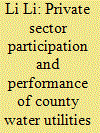| Srl | Item |
| 1 |
ID:
099323


|
|
|
|
|
| Publication |
2010.
|
| Summary/Abstract |
When grand institutional reforms based on idealized models are stalled by the poor institutional environments and difficult politics which often surround large infrastructure systems in developing countries, partial reforms whose design and implementation take into account the different interests of the key stakeholders can provide valuable and immediate benefits while moving these systems from low- towards higher-level equilibria. Strategically negotiated, experimentally partial and purposefully hybrid, these reforms are based on careful stakeholder analysis and strategic coalition building that avoid rigid positions based on idealized models. Our findings are based on a study of power sector reforms in India, where we performed a micro-level and in-depth analysis of a partial and innovative experiment which has allowed private sector participation in electricity distribution within a hostile institutional environment.
|
|
|
|
|
|
|
|
|
|
|
|
|
|
|
|
| 2 |
ID:
092800


|
|
|
|
|
| Publication |
2009.
|
| Summary/Abstract |
Under the "Private Sector Participation in Micro-Hydro Development Project in Rwanda", four newly registered Rwandan companies are each constructing a micro-hydro electricity plant (100-500 kW) and building a low-voltage distribution grid. These companies financed their plants through their own equity and debt with support from the PSP Hydro project. This support comprised a subsidy of 30-50% of investment costs, technical and business development assistance, project monitoring and financial controlling. The experiences gained so far have important implications for similar future micro-hydro energy sector development projects and this paper puts forward three key messages: (i) institutional arrangements rather than technical quality determine the success of such projects; (ii) truly sustainable rural electrification through micro-hydro development demands a high level of local participation at all levels and throughout all project phases, not just after plant commissioning; and (iii) real impact and sustainability can be obtained through close collaboration of local private and financial sector firms requiring only limited external funds. In short, micro-hydro projects can and will be taken up by local investors as a business if the conditions are right. Applying these messages could result in an accelerated uptake of viable micro-hydro activities in Rwanda, and in the opinion of the authors elsewhere too.
|
|
|
|
|
|
|
|
|
|
|
|
|
|
|
|
| 3 |
ID:
163330


|
|
|
|
|
| Summary/Abstract |
In the early 1990s, China opened its urban water sector to private investors to secure the country's growing urban water demand. In Chinese counties which accommodated around 195 million urban population in 2012, private sector participation (PSP) has progressed slowly but steadily among the county-level water utilities. Using a panel data set extracted from the annual surveys conducted by the National Bureau of Statistics of China (1998–2006), we exploit the changes in the PSP status of water utilities and apply a fixed-effects model to identify the causal effects of PSP on 12 performance indicators. We find that utilities with private investment enjoyed significant performance improvement in three areas: output, financial performance and profitability, and efficiency. Using supplementary data from population censuses and statistical yearbooks, we find that water quality is slightly lowered under PSP, while no significant effect is detected for the other service outcomes. The findings suggest that a greater role of PSP in the urban water supply sector of Chinese counties could be promoted.
|
|
|
|
|
|
|
|
|
|
|
|
|
|
|
|
| 4 |
ID:
090018


|
|
|
|
|
| Publication |
2009.
|
| Summary/Abstract |
The aim of this paper is to explore the processes and outcomes of neoliberalism in relation to urban water supply in the city of Tagbilaran, the Philippines, in order to provide a nuanced account of (an) actually existing hybrid neoliberal space. Using Bakker's typology of market environmentalist reforms in resource management as a guiding frame to link this case to a bigger 'neoliberal' conversation, I distinguish how reforms to resource governance at the national level, coupled with changes in the ways in which resource management institutions and resource management organisations function at the local level have acted to constitute local practices of neoliberal governance. Local articulations of (national and supranational) neoliberal and development discourses are revealed as a means for reconceptualising the role of the state and the emergence of new forms of hybrid governance in Tagbilaran. Analysis of the operation of BWUI, a public/private water utility, and the politics of privatisation/private sector participation enables a closer inspection of how water and water services are politicised and resisted by local publics.
|
|
|
|
|
|
|
|
|
|
|
|
|
|
|
|